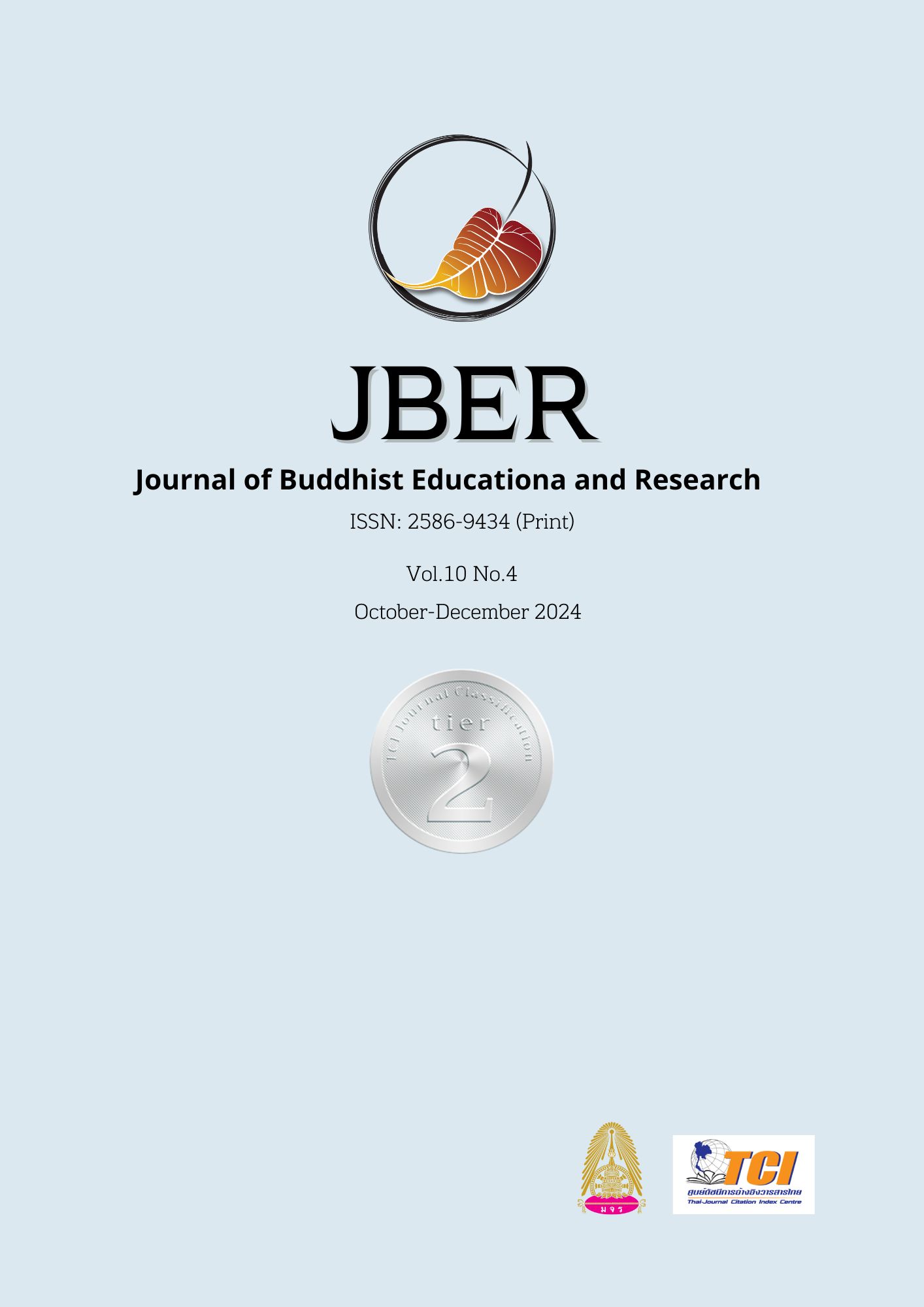The Effects of Learning Activities on the Topic of Law and Us Using Game-Based Learning Combined with Case Studies on the Learning Achievement and Analytical Thinking Skills for Matthayomsuksa 2 Students
Keywords:
learning achievement, analytical thinking skills, Game-Based Learning combined with case studiesAbstract
The objectives of this research are: 1) to compare the learning achievement before and after the learning activities of students who received game-based learning combined with case studies; 2) to compare the learning achievement after the learning activities of students who received game-based learning combined with case studies with those who received traditional learning methods; 3) to compare the analytical thinking skills before and after the learning activities of students who received game-based learning combined with case studies; 4) to compare the analytical thinking skills after the learning activities of students who received game-based learning combined with case studies with those who received traditional learning methods; 5) to study the satisfaction of students who received game-based learning combined with case studies. The target group consisted of 72 Matthayomsuksa 2 Students from Yantakaorattachanupatham School. The research tools included: 1) learning plans using game-based learning combined with case studies, 2) traditional learning plans, 3) a learning achievement test on the topic "Law and Us", 4) an analytical thinking skills test, and 5) a satisfaction evaluation form for students who received game-based learning combined with case studies. The data were analyzed using mean, standard deviation, t-test for independent samples, and t-test for dependent samples. The research results found that: 1) the learning achievement of students who received game-based learning combined with case studies was significantly higher after learning than before learning at the .05; 2) the learning achievement of students who received game-based learning combined with case studies was significantly higher than those who received traditional learning methods at the .05; 3) the analytical thinking skills of students who received game-based learning combined with case studies were significantly higher after learning than before learning at the .05; 4) the analytical thinking skills of students who received game-based learning combined with case studies were significantly higher than those who received traditional learning methods at the .05; 5) the students' satisfaction with game-based learning combined with case studies was at the highest level (x̄=4.89, S.D.= 0.26)
References
กระทรวงศึกษาธิการ. (2551). หลักสูตรแกนกลางการศึกษาขั้นพื้นฐาน พุทธศักราช 2551.กรุงเทพฯ: โรงพิมพ์ชุมนุมสหกรณ์การเกษตรแห่งประเทศไทย.
ธัญวดี กําจัดภัย, จตุรพร กัณหา และประกายแก้ว เสียงหวาน. (2567). การพัฒนาผลสัมฤทธิ์ทางการเรียนด้วยเทคนิคการจัดการเรียนรู้โดยใช้เกมเป็นฐาน เรื่อง โครงสร้างระบบเครือข่าย สำหรับมัธยมศึกษาปีที่ 6. มหาวิทยาลัยนเรศวร.
ธีรนันทน์ ไกรเลิศ และดรุณีจำปาทอง. (2564). ผลการจัดการเรียนรู้โดยใช้กรณีศึกษา เรื่อง สันติวัฒนธรรมที่มีผลต่อความสามารถในการคิดวิเคราะห์ของนักศึกษาระดับประกาศนียบัตรวิชาชีพชั้นสูงวิทยาลัยเทคนิคกระบี่. คุรุสภาวิทยาจารย์. 2(2). 74-84.
พรชนก กันไว. (2566). รูปแบบการจัดการเรียนรู้โดยใช้เกมเป็นฐาน เพื่อพัฒนาทักษะการคิดวิเคราะห์ในวิชาสังคมศึกษา สาระเศรษฐศาสตร์ของนักเรียนชั้นประถมศึกษาปีที่ 3. (วิทยานิพนธ์ปริญญามหาบัณฑิต). มหาวิทยาลัยนเรศวร.
วสุรัตน์ รอดโรคา. (2559) ผลการใช้การจัดการเรียนรู้แบบสืบเสาะหาความรู้ผนวกเทคนิคการคิดหมวก 6 ใบ ที่มีต่อผลสัมฤทธิ์ทางการเรียนวิชาวิทยาศาสตร์พื้นฐานและความสามารถ ในการคิดวิเคราะห์ ของนักเรียนชั้นมัธยมศึกษาปีที่ 5 จังหวัดสุพรรณบุรี . มหาวิทยาลัยสุโขทัยธรรมาธิราช/นนทบุรี.
วิธวรรธน์ สีชื่น. (2564). ผลการจัดการเรียนรู้วิชาพลศึกษาตามหลักการทรงงานของในหลวงรัชกาลที่ 9 และการใช้เกมเป็นฐาน ที่มีต่อผลสัมฤทธิ์ทางการเรียนของนักเรียนชั้นมัธยมศึกษาตอนต้น. มหาวิทยาลัยราชภัฏเพชรบูรณ์.
สำนวน คุณพล. (2566). การจัดการเรียนรู้โดยใช้เกมเป็นฐานเพื่อพัฒนาผลสัมฤทธิ์ทางการเรียนวิชาคณิตศาสตร์ของนักเรียนระดับชั้นมัธยมศึกษาปีที่ 1. โรงเรียนสาธิตสถาบันการจัดการปัญญาภิวัฒน์.
สุดารัตน์ วัดปลั่ง, ฉวีวรรณ เอี่ยมพญา และอัจฉรา ปุราคม. การพัฒนาความสามารถการคิดวิเคราะห์รายวิชาสุขศึกษา เรื่องพฤติกรรมเสี่ยงต่อสุขภาพ ด้วยวิธีการสอนโดยเกม ROV ของนักเรียนชั้นมัธยมศึกษาปีที่ 2. มหาวิทยาลัยเกษตรศาสตร์.
อธิป อนันต์กิตติกุล. (2564). การพัฒนาความสามารถในการคิดวิเคราะห์ด้วยการจัดการเรียนรู้โดยใช้เกมเรื่องพัฒนาการ ความร่วมมือและความขัดแย้งในประวัติศาสตร์สากลของนักเรียนระดับชั้นมัธยมศึกษาปีที่ 3 โรงเรียนสาธิตมหาวิทยาลัยศิลปากร. (วิทยานิพนธ์ศึกษาศาสตรมหาบัณฑิต). มหาวิทยาลัยศิลปากร.
อภิชญาวีร์ จันทรเขตต์. (2563). การพัฒนาการเรียนรู้โดยใช้กรณีศึกษาจากสื่อในชีวิตประจำวัน เรื่องพฤติกรรมการบริโภค เพื่อเสริมสร้างความสามารถในการคิดไตร่ตรองสำหรับนักเรียนชั้นมัธยมศึกษาปีที่ 3. (วิทยานิพนธ์ปริญญามหาบัณฑิต). มหาวิทยาลัยนเรศวร.
Bloom's Taxonomy: The Psychomotor Domain. (2024, June 18). Retrieved from
http://www.nwlink.com/~donclark/hrd/Bloom/psychomotor_domain.html
Ching-Hsueh, C., & Chung-Ho, S. (2555). A Game-based learning system for improving student's
learning effectiveness in system analysis course. National Yunlin University of Science and Technology.
McMillan, J. H. (1996). Educational research: Fundamentals for the consumer (2nd ed.).
HarperCollins.
Downloads
Published
How to Cite
Issue
Section
License
Copyright (c) 2024 Journal of Buddhist Education and Research (JBER)

This work is licensed under a Creative Commons Attribution-NonCommercial-NoDerivatives 4.0 International License.





